Engineers cut iridium use by 80% in breakthrough hydrogen catalyst
In the global effort to fight climate change, hydrogen is emerging as a powerful clean fuel—one that can power factories, vehicles, and even cities...
Calcium could unlock stable, low-cost sodium batteries for the future
Lithium-ion batteries power nearly everything in our modern lives—from smartphones to electric vehicles—but lithium is both scarce and unevenly distributed around the world.
As demand...
“Textile nerves” could turn everyday clothing into smart, responsive fabrics
Imagine wearing clothes that can sense movement, generate power, or even help you walk.
That’s the idea behind a groundbreaking research project on “textile nerves”...
Scientists create ultrafast, light-controlled memory with new material
Scientists have discovered a completely new way to store digital information—using light and a rare class of materials called ferroaxials.
The breakthrough could lead to...
Artificial muscle that lifts 4,000 times its own weight could revolutionize soft robotics
Imagine a material that can behave like both soft rubber and hard steel—stretchy and gentle when needed, yet powerful enough to lift thousands of...
Astronomers find water traces in an interstellar visitor
For millions of years, a tiny icy fragment wandered through space—like a sealed bottle drifting across a cosmic ocean.
This summer, that “message in a...
Scientists use light to create electron gas, opening door to ultra-fast electronics
Imagine future smartphones and computers that run on light instead of electricity—making them faster, more efficient, and cooler to the touch.
Scientists have now taken...
Study shows what’s really hiding in plastic bottled water
The beautiful beaches of Thailand’s Phi Phi Islands may seem like an odd place to begin a PhD journey, but for Sarah Sajedi, a...
Scientists create sustainable plastic from the carbon dioxide in the ocean
The ocean absorbs about a quarter of all carbon dioxide (CO₂) released by human activity, helping to slow climate change—but at a cost.
This constant...
Paper-thin LED shines like the sun and could transform future screens
Imagine wallpaper that glows like natural sunlight or a phone screen that’s easy on your eyes even at night.
Scientists have now developed a paper-thin...










